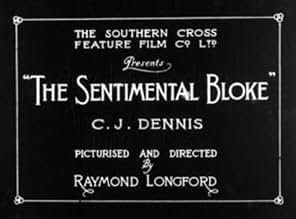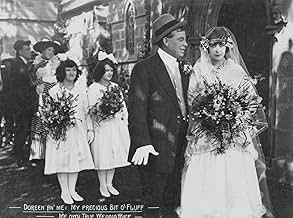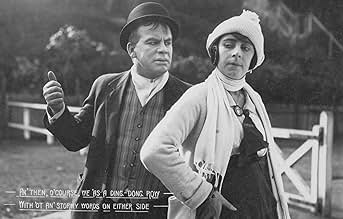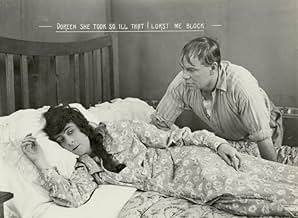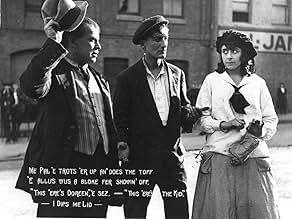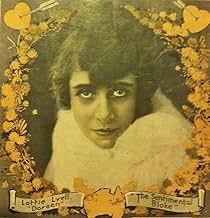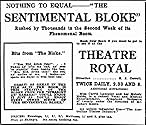Agrega una trama en tu idiomaA down-at-heal ex-convict undergoes an epiphany as he experiences the love of a good woman for the first time.A down-at-heal ex-convict undergoes an epiphany as he experiences the love of a good woman for the first time.A down-at-heal ex-convict undergoes an epiphany as he experiences the love of a good woman for the first time.
- Dirección
- Guionistas
- Elenco
- Dirección
- Guionistas
- Todo el elenco y el equipo
- Producción, taquilla y más en IMDbPro
Opiniones destacadas
The Australian film industry, one of early cinema's most vibrant country for movie productions, was slowly diminishing after 1912 because of business consolidations in studio and distribution companies. By the mid-1920's, 94% of all films shown in Australia were American-made.
But one movie released in Oct. 1919, "The Sentimental Bloke," gave hope to Australia's big screen model. The feature film was a huge success not only in Down Under but in New Zealand as well as in the United Kingdom. The main ingredient for success was its natural portrayal of Australia's working class members, a populace movie audiences around the English speaking world related to.
"The Sentimental Bloke," based on the hugely popular 1915 verse novel 'The Songs of a Sentimental Bloke,' by C. J. Dennis, has its title cards within the movie containing verses taken directly from Dennis' work. Critics agree "The Sentimental Bloke" is Australia's best silent movie and one of the finest motion pictures to be produced Down Under.
Its storyline is fairly simple: a scruffy laborer (played by Arthur Tauchert, himself a manual worker before becoming a vaudeville comedian in the early 1900's) is jailed for illegal gambling, and meets a female pickle factory worker once released. The movie traces their up and down relationship. She reprimands him for his drinking episodes with his mates at the same time a more sophisticated man has his sights on her. The circumstances of the normal working class romance tickles the hearts of even the most jaded viewers, illustrating how movies can cause an upwelling of emotions to those who can relate to its characters.
What makes "The Sentimental Bloke" even more remarkable today is its city scenes were shot in the dock neighborhood of Woolloomooloo, Sydney, Australia, a rough working class area during the early 1900's. The close proximity to the ocean has recently gentrified the district to become a highly desirable place to live.
A sequel, "Ginger Mick," was produced in 1920 as well as a 1932 talkie remake. But none achieved the look or status of the 1919 original. Like many thought-lost silent movies that were recently discovered, "The Sentimental Bloke" was found by shear luck in the cubbyholes of the George Eastman House archives in 1973 and fully restored.
But one movie released in Oct. 1919, "The Sentimental Bloke," gave hope to Australia's big screen model. The feature film was a huge success not only in Down Under but in New Zealand as well as in the United Kingdom. The main ingredient for success was its natural portrayal of Australia's working class members, a populace movie audiences around the English speaking world related to.
"The Sentimental Bloke," based on the hugely popular 1915 verse novel 'The Songs of a Sentimental Bloke,' by C. J. Dennis, has its title cards within the movie containing verses taken directly from Dennis' work. Critics agree "The Sentimental Bloke" is Australia's best silent movie and one of the finest motion pictures to be produced Down Under.
Its storyline is fairly simple: a scruffy laborer (played by Arthur Tauchert, himself a manual worker before becoming a vaudeville comedian in the early 1900's) is jailed for illegal gambling, and meets a female pickle factory worker once released. The movie traces their up and down relationship. She reprimands him for his drinking episodes with his mates at the same time a more sophisticated man has his sights on her. The circumstances of the normal working class romance tickles the hearts of even the most jaded viewers, illustrating how movies can cause an upwelling of emotions to those who can relate to its characters.
What makes "The Sentimental Bloke" even more remarkable today is its city scenes were shot in the dock neighborhood of Woolloomooloo, Sydney, Australia, a rough working class area during the early 1900's. The close proximity to the ocean has recently gentrified the district to become a highly desirable place to live.
A sequel, "Ginger Mick," was produced in 1920 as well as a 1932 talkie remake. But none achieved the look or status of the 1919 original. Like many thought-lost silent movies that were recently discovered, "The Sentimental Bloke" was found by shear luck in the cubbyholes of the George Eastman House archives in 1973 and fully restored.
This film is reputed to have been the best of Australia's hundreds of silent films made between 1906 and 1930.
It is one of the few to survive intact, and the photography is clean and beautifully framed. The acting is naturalistic, the characters engaging, and the 'dialogue' (intertitles), in Australian slang of the period, is hilarious, being taken from the popular 1915 poem The Songs of a Sentimental Bloke by C. J. Dennis.
Arthur Tauchert is fabulous as the 'rough diamond' Bill and Australia's darling Lottie Lyell is good too. It's wonderful to see Sydney as it was in 1919, with all the horses and old suits, hats, dresses and olde worlde accoutriments.
This is a film that can still entertain after 100 years.
It is one of the few to survive intact, and the photography is clean and beautifully framed. The acting is naturalistic, the characters engaging, and the 'dialogue' (intertitles), in Australian slang of the period, is hilarious, being taken from the popular 1915 poem The Songs of a Sentimental Bloke by C. J. Dennis.
Arthur Tauchert is fabulous as the 'rough diamond' Bill and Australia's darling Lottie Lyell is good too. It's wonderful to see Sydney as it was in 1919, with all the horses and old suits, hats, dresses and olde worlde accoutriments.
This is a film that can still entertain after 100 years.
It was a treat to watch this Australian silent, A Sentimental Bloke, with Lottie Lyell, who was called Australia's first movie star. An adaptation of the popular poem by Australian poet C.J. Dennis, the film was humorous and homey. It tells the tale of a ordinary "bloke" whose life is transformed by love. The Australian slang in the title cards made them a real challenge to read, but the acting style is so natural that it's not hard to understand what's going on. Arthur Tauchert, as the bloke, brings just the right amount of roughness and pathos to the part as he undergoes his transformation, and Lottie Lyell as Doreen, just the right amount of working girl toughness and maidenly sweetness. You can tell that she was ill during the shooting of the movie, and she died young of tuberculosis, bringing to an end a fine collaboration with film maker Raymond Longford.
It does not do, in my view, to worship at he altar of conventional cinema historiography (grossly US-centred for the most part. Nor should one imagine something magical in a litany of names (D. W. Griffith, Maurice Tourneur, Victor Sjöström) simply because of the "canonical" view that these film-makers are "auteurs", a fatuous (and largely meaningless) term that means undue attention is based even to the poor films made by such directors at the expense of rather good films by directors who have not been awarded the same (entirely spurious) title or whose films do not fit neatly into the "standard" (again, largely US-centred) view of cinema history. Longford's. The Sentimental Bloke is quite evidently fated to be too often a casualty of both these typical critical prejudices.
Free oneself from these notions and one can see without difficulty that The Sentimental Bloke has many virtues lacking in the great majority of films of the period (those of Griffith, Tourneur and even to some extent of Sjöström quite as much as those by the many, many lesser lights.
1) First, very simply, it is a quite different sort of film from most of its contemporaries and stands out by virtue of its very individual character. It is not the only film by any means to have been made from a poem; this was quite common practice especially in the early years of cinema, but it tended to be a rather weak genre because of the thinness of the material. The Sentimental Bloke is far and away the best of the bunch (which include several very mediocre Griffith films and Sjöström's rather laborious Terje Vigen, based on an Ibsen poem, which came out just two years before this). A more striking difference still, is that, despite the ironic title,it is almost completely lacking in the kind of sentimentality and melodrama that tends to be the bane of films of this period. Compared for instance with Tourneur's Pride of the Clan (a very run-of-the-mill Pickford melodrama of 1917) or Griffith's rather maudlin Broken Blossoms, which came out in the same year, this Australian film really has a freshness and zing, even a certain pleasing cynicism, to it that those other films cannot boast. Not to mention the nauseatingly sentimental Griffith films A Romance of Happy Valley and Trueheart Susie, which both came out in 1919, or the dire series of war-propaganda films that Griffith and Pickford both turned out in 1918-1919. Or indeed DeMille's rather bizarre 1919 version of the James Barrie play, The Admirable Crichton (Male and Female). Whatever the US' technical advantages (overstated when compared with the far superior German film industry of the time),it compensated for negatively, then as now, by sheer bad taste in terms of content.
2. A second very strong plus of this film, despite its light-hearted nature, is its naturalism, not just in the acting style but more importantly in its subject-matter (the everyday lives of ordinary folk( and in its very effective location-shooting. Naturalism, then as now, was almost unknown in US film although it would come during the twenties to have a strong place in European film. It is quite interesting to note that both this Australian film and the equally marginalised Back to God's Country by Canadian director Nell Shipman (also 1919) in neither case slavishly follow US lines, as one might have expected them to do, but both have a much less restrictive style, with plenty of depth and context to the cinematography more typical of contemporary European films (compare for instance the relatively claustrophobic studio-bound feel,despite its colonial setting, of Tourneur's Victory in this same year, one of his most conventional, US-style films).
3. The film, like the poem, bristles with a fine self-deprecating irony. To treat its characters and their apparent behaviour at first degree (when everything about the film is clearly at second degree) is to totally misread it. Yes, there is a quite deliberate degree of "stereotyping" but these stereotypes are continually being ridiculed and undermined throughout the film. The poem is quite the opposite of vulgar outback-horseplay; it is a very sophisticated and witty piece of work that turns everything Australian inside-out. And I think the film does a very good job of conveying that. And the manner in which it faithfully reflects the rhythm of the original (and this is a vital but generally neglected aspect of filming a poem) is really most unusual and very remarkable. De Grasse's US film The Old Swimmin' Hole of 1921 attempts something similar but is not nearly such a good film.
Most people have described the film's "charm" and it i impossible to avoid the word when talking about it. It is immensely charming and stands out immediately from any list of the plays of the year precisely because it is so different from the others. And yet it was a strong year for film. Less so perhaps in the increasingly convention-bound US; the best US film of the year by quite a margin is Von Stroheim's Blind Husbands; European films, on the other hand, are much more varied and powerful (Lubitsch' Madame DuBarry, Gance's J'Accuse, Dreyer's Praesidenten, Holger-Madsen's Mod Lyset, Oswald's Anders als die Andern, Lang's Hara Kiri - a list to which one could go on adding). Even so this Australian film has a great deal to recommend it. It remains one of the most distinctive films of the year and, while this may be something of a sideways compliment, it remains quite the best Australian film I have personally ever seen.
Free oneself from these notions and one can see without difficulty that The Sentimental Bloke has many virtues lacking in the great majority of films of the period (those of Griffith, Tourneur and even to some extent of Sjöström quite as much as those by the many, many lesser lights.
1) First, very simply, it is a quite different sort of film from most of its contemporaries and stands out by virtue of its very individual character. It is not the only film by any means to have been made from a poem; this was quite common practice especially in the early years of cinema, but it tended to be a rather weak genre because of the thinness of the material. The Sentimental Bloke is far and away the best of the bunch (which include several very mediocre Griffith films and Sjöström's rather laborious Terje Vigen, based on an Ibsen poem, which came out just two years before this). A more striking difference still, is that, despite the ironic title,it is almost completely lacking in the kind of sentimentality and melodrama that tends to be the bane of films of this period. Compared for instance with Tourneur's Pride of the Clan (a very run-of-the-mill Pickford melodrama of 1917) or Griffith's rather maudlin Broken Blossoms, which came out in the same year, this Australian film really has a freshness and zing, even a certain pleasing cynicism, to it that those other films cannot boast. Not to mention the nauseatingly sentimental Griffith films A Romance of Happy Valley and Trueheart Susie, which both came out in 1919, or the dire series of war-propaganda films that Griffith and Pickford both turned out in 1918-1919. Or indeed DeMille's rather bizarre 1919 version of the James Barrie play, The Admirable Crichton (Male and Female). Whatever the US' technical advantages (overstated when compared with the far superior German film industry of the time),it compensated for negatively, then as now, by sheer bad taste in terms of content.
2. A second very strong plus of this film, despite its light-hearted nature, is its naturalism, not just in the acting style but more importantly in its subject-matter (the everyday lives of ordinary folk( and in its very effective location-shooting. Naturalism, then as now, was almost unknown in US film although it would come during the twenties to have a strong place in European film. It is quite interesting to note that both this Australian film and the equally marginalised Back to God's Country by Canadian director Nell Shipman (also 1919) in neither case slavishly follow US lines, as one might have expected them to do, but both have a much less restrictive style, with plenty of depth and context to the cinematography more typical of contemporary European films (compare for instance the relatively claustrophobic studio-bound feel,despite its colonial setting, of Tourneur's Victory in this same year, one of his most conventional, US-style films).
3. The film, like the poem, bristles with a fine self-deprecating irony. To treat its characters and their apparent behaviour at first degree (when everything about the film is clearly at second degree) is to totally misread it. Yes, there is a quite deliberate degree of "stereotyping" but these stereotypes are continually being ridiculed and undermined throughout the film. The poem is quite the opposite of vulgar outback-horseplay; it is a very sophisticated and witty piece of work that turns everything Australian inside-out. And I think the film does a very good job of conveying that. And the manner in which it faithfully reflects the rhythm of the original (and this is a vital but generally neglected aspect of filming a poem) is really most unusual and very remarkable. De Grasse's US film The Old Swimmin' Hole of 1921 attempts something similar but is not nearly such a good film.
Most people have described the film's "charm" and it i impossible to avoid the word when talking about it. It is immensely charming and stands out immediately from any list of the plays of the year precisely because it is so different from the others. And yet it was a strong year for film. Less so perhaps in the increasingly convention-bound US; the best US film of the year by quite a margin is Von Stroheim's Blind Husbands; European films, on the other hand, are much more varied and powerful (Lubitsch' Madame DuBarry, Gance's J'Accuse, Dreyer's Praesidenten, Holger-Madsen's Mod Lyset, Oswald's Anders als die Andern, Lang's Hara Kiri - a list to which one could go on adding). Even so this Australian film has a great deal to recommend it. It remains one of the most distinctive films of the year and, while this may be something of a sideways compliment, it remains quite the best Australian film I have personally ever seen.
After waiting many months, I saw the restored version of "The Sentimental Bloke" for the first time at the Perth International Arts Festival last night. Worth it? My oath. "I dips me lid" to the blokes and tarts wot worked on this "Aussie Icon". The story of the restoration is a tale in itself - the only existing prints were "not the best" and through a "mislabelling" it turned out that an almost pristine copy had been filed in a United States film archive as "The Sentimental Blonde", and was apparently an original negative. I'll let the reader research this story further.
C.J. Dennis ("Den") is one of Australia's best loved poets, and "(Songs of) The Sentimenal Bloke" one of his most enduring and endearing collections of the Australian Idiom ever published. (Apparently the US version of the film had "American" inter titles - WHAT the Americans would have made of it is thoroughly beyond me. I think if would have come out as completely foreign language).
In brief, this film traces the life of "The Kid" or "Bill" in his transition from street tough (read gang member) to husband to "Doreen" (his "bit of fluff") and loving father, but done with humour and tear jerking sentiment - as it should be. Schmaltz with a capital "S".
Highlight of the movie for me was a fairly thorough airing of one of Den's most popular poems, "The Play", which describes how Bill and Doreen go to see "Romeo and Juliet"
Romeo -
" .... wiv a yell, plunks Tyball through the gizzard wiv 'is sword,
'Ow I ongcored!
"Put in the boot!" I sez. "Put in the boot!"
"Ush!" sez Doreen ... "Shame! sez some silly coot."
As a bonus, the performance I attended had a live three piece "bush band" ("The Larrikins") playing a musical accompaniment, specially composed for the event.
I was slightly confused at first, since the original poem was set in Melbourne, but the film was shot in Sydney, and I found myself looking at Central Railways Station when I should have been looking at Flinders Street station. Artistic licence.
Considering the prodigious output of "Den's" pen, the movie could only skim the surface, but this was sufficient for me to be able look and see "Bill" and "Doreen" (not to mention his best cobber "Ginger Mick") made flesh and blood with a lashing of the original humour and pathos.
Whilst the film characters did not follow Hal Gye's original illustrations very closely (a wise move since Gye's little "Cherubs" all appeared "sans culottes") I had no trouble recognising them.
I think "Den" would'a been proud of it fit to bust his vest.
C.J. Dennis ("Den") is one of Australia's best loved poets, and "(Songs of) The Sentimenal Bloke" one of his most enduring and endearing collections of the Australian Idiom ever published. (Apparently the US version of the film had "American" inter titles - WHAT the Americans would have made of it is thoroughly beyond me. I think if would have come out as completely foreign language).
In brief, this film traces the life of "The Kid" or "Bill" in his transition from street tough (read gang member) to husband to "Doreen" (his "bit of fluff") and loving father, but done with humour and tear jerking sentiment - as it should be. Schmaltz with a capital "S".
Highlight of the movie for me was a fairly thorough airing of one of Den's most popular poems, "The Play", which describes how Bill and Doreen go to see "Romeo and Juliet"
- "The drama's writ be Shakespeare, many years ago, About a barmy goat called Romeo".
Romeo -
" .... wiv a yell, plunks Tyball through the gizzard wiv 'is sword,
'Ow I ongcored!
"Put in the boot!" I sez. "Put in the boot!"
"Ush!" sez Doreen ... "Shame! sez some silly coot."
As a bonus, the performance I attended had a live three piece "bush band" ("The Larrikins") playing a musical accompaniment, specially composed for the event.
I was slightly confused at first, since the original poem was set in Melbourne, but the film was shot in Sydney, and I found myself looking at Central Railways Station when I should have been looking at Flinders Street station. Artistic licence.
Considering the prodigious output of "Den's" pen, the movie could only skim the surface, but this was sufficient for me to be able look and see "Bill" and "Doreen" (not to mention his best cobber "Ginger Mick") made flesh and blood with a lashing of the original humour and pathos.
Whilst the film characters did not follow Hal Gye's original illustrations very closely (a wise move since Gye's little "Cherubs" all appeared "sans culottes") I had no trouble recognising them.
I think "Den" would'a been proud of it fit to bust his vest.
¿Sabías que…?
- TriviaThe film had a special revival screening at the Sydney Film Festival in 1955 at the University of Sydney.
- ConexionesFeatured in Forgotten Cinema: The Golden Age of Australian Motion Pictures (1967)
Selecciones populares
Inicia sesión para calificar y agrega a la lista de videos para obtener recomendaciones personalizadas
Detalles
- Fecha de lanzamiento
- País de origen
- Idiomas
- También se conoce como
- Сентиментальный парень
- Locaciones de filmación
- Adelaida, Australia Meridional, Australia(shots of sunsets & sunrises for the intertitles)
- Productora
- Ver más créditos de la compañía en IMDbPro
Taquilla
- Total a nivel mundial
- USD 160
- Tiempo de ejecución
- 1h 46min(106 min)
- Color
- Mezcla de sonido
- Relación de aspecto
- 1.33 : 1
Contribuir a esta página
Sugiere una edición o agrega el contenido que falta

